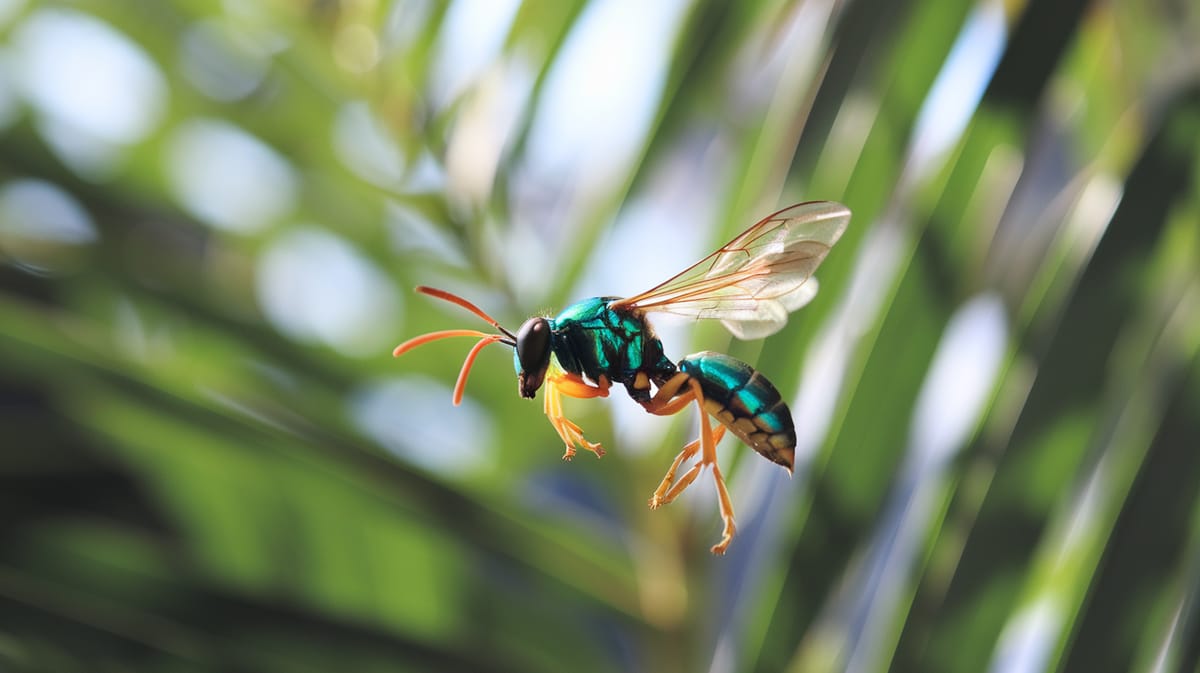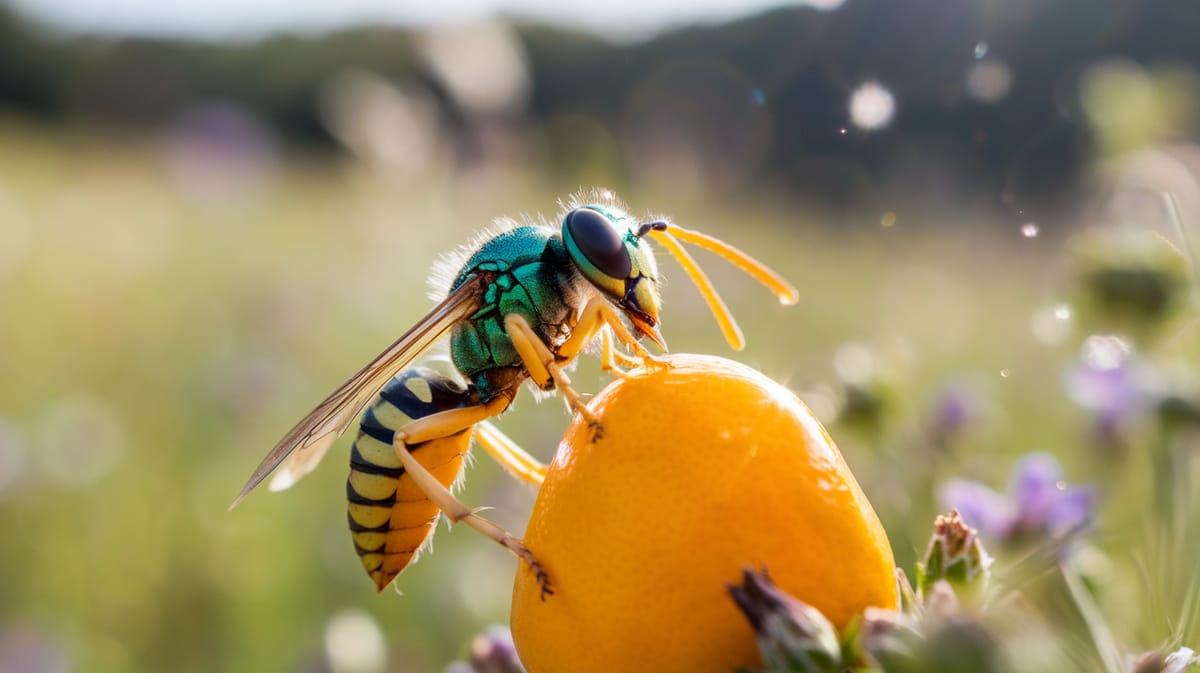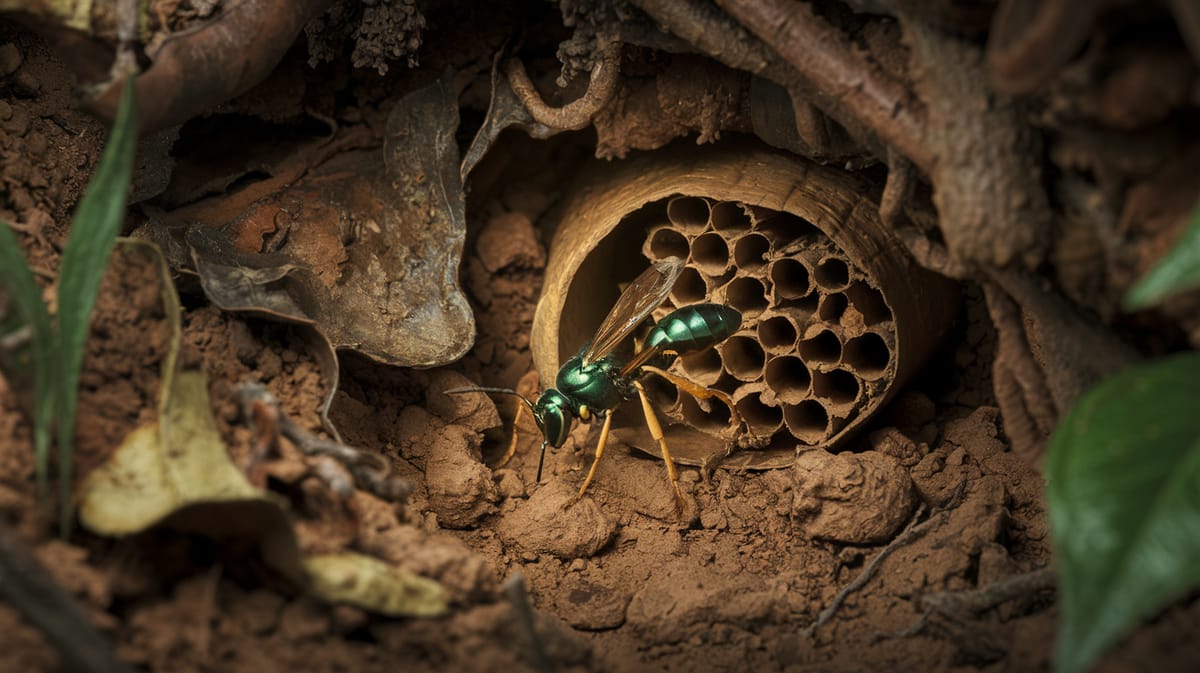Jewel Wasp
With its metallic sheen and precise parasitic behavior, the Jewel Wasp is both an artist and tactician in nature's intricate web. It masterfully controls cockroach hosts for its larvae.

Key Insights at a Glance
Did You Know?
Taxonomy & Classification
Jewel Wasps exhibit extraordinary parasitic behavior, using their venomous sting to manipulate cockroach hosts, a testament to their evolutionary specialization. Let's understand the evolutionary journey and classification of these remarkable Parasites, Predators.
Global Presence
The genus Ampulex includes around 130 species, predominantly found in tropical regions, showcasing a wide distribution and adaptability.
Evolutionary Adaptations
Jewel Wasps have evolved over millions of years, developing unique venom to control their prey, a prime example of evolutionary innovation.
Lifecycle and Growth
A remarkable journey of transformation from Egg to Adult.
Egg
Eggs are laid inside a paralyzed cockroach, providing a secure and nutrient-rich environment for developing larvae.
Larva
Larvae consume the cockroach's internal organs while keeping it alive to ensure fresh food.
Pupa
During pupation, larvae transform into adults while encased within the host's body.
Adult
Adults emerge fully developed, capable of flying and mating to continue their lifecycle.
Dietary Habits
A parasitic predator known for its precision, this insect primarily targets cockroaches, employing a unique venomous sting to subdue them.
| DIET TYPE | DESCRIPTION |
|---|---|
| Primary Diet | Primarily targets cockroaches, injecting venom to control their behavior and provide a living host for its larvae. |
| Secondary Diet | Occasionally consumes nectar and other small insects, supplementing its diet with accessible nutrients when needed. |
| Occasional | Rarely takes advantage of fallen fruit or sugary substances, displaying opportunistic feeding in resource-scarce environments. |

Behaviour and Adaptations
Discover the fascinating traits that define the Jewel Wasp's unique survival strategies.
Mind Control
Injects venom to manipulate cockroach behavior, rendering them passive.
Parasitic Precision
Lays eggs inside a host, ensuring larvae have immediate food.
Stinger Accuracy
Precisely targets cockroach brain for effective control.
Ecosystem Impact
Maintaining ecological balance through its unique interactions.
Parasite Population Control
Controls cockroach populations by parasitizing them, preventing overpopulation.
Biodiversity Support
Enhances biodiversity by allowing other insect species to thrive in balanced numbers.
Nutrient Cycling
Contributes to nutrient cycling by breaking down organic matter through its hosts.
Conservation Challenges
Understanding and addressing the major threats to Jewel Wasp populations.
Habitat Destruction
Urbanization and deforestation reduce vital breeding and foraging areas for Jewel Wasps.
Pesticide Use
Chemical pesticides harm Jewel Wasps directly and disrupt their ecological role.
Climate Change
Altered weather patterns affect Jewel Wasp behavior and lifecycle.
Frequently Asked Questions
How long do Jewel Wasp live?
Jewel Wasps typically live for about three to four months. Their lifespan varies depending on environmental conditions and availability of hosts for their larvae. These wasps are solitary, and females focus on finding cockroaches to serve as hosts for their developing offspring.
What do Jewel Wasp eat?
Adult Jewel Wasps primarily consume nectar and other sugary substances. Their larvae, however, feed on cockroaches, which the adult female paralyzes and lays eggs on. The developing larvae consume the cockroach from the inside, ensuring a fresh food supply.
Are Jewel Wasp poisonous?
Jewel Wasps are not poisonous to humans. They use venom to paralyze cockroaches, their preferred hosts for laying eggs. This venom is highly specialized and does not pose a threat to humans or other animals outside their targeted prey.
Are Jewel Wasp endangered?
Jewel Wasps are not currently classified as endangered. They are found in various tropical regions and have a stable population due to their unique reproductive strategy and adaptability within their environment. Their survival is not currently at risk.
What do Jewel Wasp symbolize?
Jewel Wasps often symbolize control and precision due to their highly specialized hunting technique. Their ability to manipulate the behavior of their prey has fascinated scientists and observers, making them a symbol of nature's complex interactions and evolutionary adaptations.
Do Jewel Wasp bite?
Jewel Wasps do not bite humans. They use their stinger to inject venom into cockroaches, which serves to paralyze the prey. This behavior is specific to their reproductive process and does not involve defensive aggression towards humans.
What color are Jewel Wasp?
Jewel Wasps are known for their striking metallic blue and green coloration. These vibrant colors make them stand out and are a result of light reflecting off microscopic structures on their exoskeleton, creating an iridescent effect.
Does a Jewel Wasp have wings?
Yes, Jewel Wasps have wings. Their wings are clear with a slight iridescent sheen, allowing them to fly efficiently. These wings enable Jewel Wasps to travel in search of cockroach hosts and nectar sources.
What does a Jewel Wasp look like?
Jewel Wasps are small, measuring about half an inch in length. They have a metallic blue-green body with a slender, wasp-like appearance. Their striking colors and iridescent wings make them easily recognizable among insects.
Is a Jewel Wasp an insect?
Yes, a Jewel Wasp is an insect. It belongs to the order Hymenoptera, which also includes ants, bees, and other wasps. As insects, they have three main body parts: head, thorax, and abdomen, along with six legs and a pair of wings.
Related Insects
Discover insects with similar characteristics to Jewel Wasp - including shared habitats, diets, and taxonomic classifications
Share this profile
Help others discover Jewel Wasp
